Why the chief of US-backed Gaza humanitarian aid group resigned
 Jake Wood who quit as the executive director of the Gaza Humanitarian Foundation. (Right) Trucks transport aid as Gaza Humanitarian Foundation said it has commenced operations to begin distribution of aid, in Rafah | Reuters
Jake Wood who quit as the executive director of the Gaza Humanitarian Foundation. (Right) Trucks transport aid as Gaza Humanitarian Foundation said it has commenced operations to begin distribution of aid, in Rafah | Reuters
The head of a controversial new humanitarian aid initiative in Gaza has resigned just hours before the programme was due to begin operations, citing insurmountable challenges to maintaining independence and neutrality.
Jake Wood, Executive Director of the Gaza Humanitarian Foundation (GHF), announced his resignation on May 25 after media investigations raised serious concerns about the group's ties to Israel. In a statement, Wood said he could not, :strictly adhere to the humanitarian principles of humanity, neutrality, impartiality, and independence," under the current conditions.
His departure followed after media reports revealed that the GHF was conceived in late 2023 by Israeli military and business leaders in coordination with American private contractors. One of the central architects was reportedly Philip F. Reilly, a former senior CIA officer, who helped design the structure of the foundation and the security arrangements for its operations.
Despite efforts to position the GHF as an independent humanitarian actor, it has been heavily criticised by United Nations officials and major aid organisations for lacking neutrality. The foundation is staffed by private contractors, including a firm run by Reilly, and operates exclusively within areas of southern and central Gaza currently under Israeli military control.
Critics argue that the aid programme could contribute to the forced displacement of Palestinians from the north to the south of Gaza, aligning with recent comments by Israeli Defence Minister Yoav Gallant and his colleague Israel Katz, who suggested that Gaza’s population should be relocated permanently.
The GHF said it remained committed to its mission, stating Monday that it had begun distributing food to Gazans from secured distribution sites and aimed to reach over one million people within a week. It condemned detractors for undermining an initiative "that dares to try new solutions," and confirmed that American aid practitioner John Acree would serve as interim executive director.
The foundation’s food distribution strategy relies on pre-selected family representatives travelling to centralised collection points. Aid agencies and the UN have criticised this model for forcing civilians to cross conflict zones on foot and excluding the population of northern Gaza, where famine conditions are most severe.
Wood, a former US Marine and founder of the aid group Team Rubicon, was appointed to lead GHF in early 2025. At the time, he believed the organisation could evolve into an independent humanitarian actor. By May, however, he concluded that this vision was unattainable. "I urge Israel to significantly expand the provision of aid into Gaza through all mechanisms," he said in his resignation statement.
In response to Wood’s resignation, the GHF claimed Hamas was issuing death threats against aid workers at its distribution points. "It is clear that Hamas is threatened by this new operating model," the group asserted.
Meanwhile, Israeli airstrikes continued to devastate Gaza. Overnight attacks on a school sheltering displaced families in Gaza City killed at least 35 people, many of them children. The Israeli military said the strike targeted a Hamas and Islamic Jihad command centre. A separate airstrike on a house in Jabalia killed 19 more.
The United Nations has repeatedly warned of a deepening humanitarian catastrophe. Secretary-General António Guterres said that Israeli restrictions on aid deliveries were exacerbating the crisis. "Without rapid, reliable, safe and sustained aid access, more people will die–and the long-term consequences on the entire population will be profound,' he warned. "The entire population of Gaza is facing the risk of famine.… The Israeli military offensive is intensifying, with atrocious levels of death and destruction."
Middle East